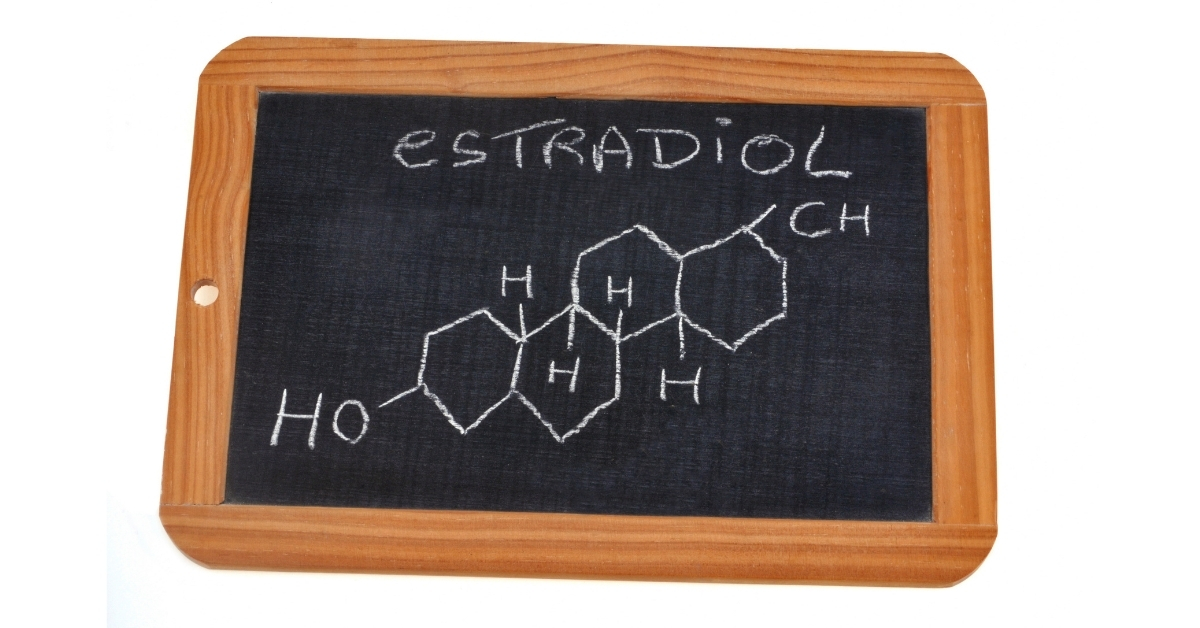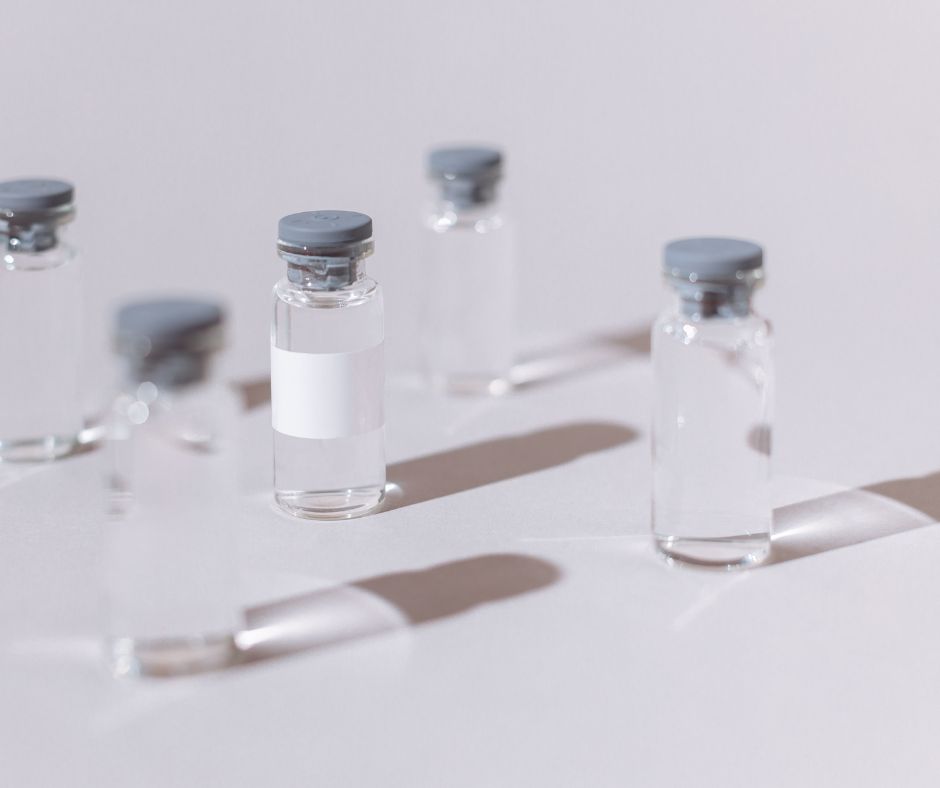Estrogen is one of the main female sex hormones (progesterone is the other) and is responsible for various functions throughout a woman’s life. It is produced by your endocrine (hormonal) system and, from there, moves around the body through your bloodstream. Estrogens then work by binding to estrogen receptors in the body.
There are two main types of receptors:
- Estrogen Receptor Alpha – Found in the ovaries, breast tissue, and endometrium.
- Estrogen Receptor Beta – Found in other parts of the body such as bones, kidneys, brain, heart, and lungs.
While most people know that estrogen is the predominant female sex hormone (men do produce it too but in much smaller amounts), many will be unaware that women produce different types of estrogen throughout their lives.
Estrogen/Estradiol Production
Estrogen is needed for various reasons depending on a woman’s age, including puberty, pregnancy, regulating periods, and even maintaining normal cholesterol levels. There are three types of estrogen that women produce over the course of their lives:
- Estradiol – This is produced predominantly by the ovaries in women of childbearing age
- Estriol – This is produced during pregnancy by the placenta
- Estrone – This is produced post-menopause.
Out of these three types of estrogen, estradiol is considered to be the strongest and most potent. Its primary function is to maintain the reproductive system. Estradiol levels are responsible for releasing the egg during the menstrual cycle and thickening the uterus to allow a fertilized egg to implant. It is primarily produced in the ovaries, so estradiol levels diminish as a woman gets older and dip significantly during and after menopause.
Too Much or Too Little?
The effect of low estradiol levels is most apparent in women experiencing menopause. Symptoms may include the infamous night sweats, hot flushes, mood swings, and vaginal dryness. Low estradiol levels can also lead to osteoporosis.
Low estradiol levels are not just linked to menopausal women. Girls may experience delayed puberty, and bone growth and development may be affected by low estradiol levels.
Although the symptoms of low estradiol resulting from menopause are the most commonly reported, women with unusually high estradiol levels may experience unwelcome and unpleasant symptoms as well.
These can include:
- Weight gain
- Menstrual problems
- Acne
- Depression
- Loss of sex drive
- Breast and uterine cancer (with extremely high levels)
- Cardiovascular disease
If you have high levels of estradiol in your blood, your doctor is likely to recommend that you make changes to your diet and lose any excess weight you may be carrying. Dietary changes could include reducing fat and increasing fiber.
Uses
The primary use of estradiol as a form of medication is to treat the symptoms of menopause. The symptoms it is most effective at easing include vaginal dryness, hot flushes, and osteoporosis. It can also be used to treat low estradiol levels in women with ovarian failure. There are also some indications that it could be beneficial in treating both breast and prostate cancer in men and women. It can be used in various forms, including patches, gel, vaginal cream, oral tablet, and injection.
Estradiol Vs. Estriol
Women undergoing HRT (hormone replacement therapy) are typically given a combination of estrogen and progesterone, with estradiol being the most common form of estrogen prescribed. Women who do not have a womb can take estrogen only. Estradiol is the only estrogen that is FDA approved for use in humans, so it is the most common form of estrogen found in HRT medication. However, while estriol is not FDA-approved for use in humans, it can be compounded with other medications for use in HRT. Such as estradiol treatments offered by EVOLVE. It can also be used as a treatment for other estrogen-related conditions such as menstrual migraines.
Dosage and Treatments
When you are prescribed estradiol, your dosage will be indicated on your medication. It is essential that you always read the patient information leaflet and take the medication as instructed. If you take an oral tablet, you will be told whether to take it with food or on an empty stomach. With the extended-release tablets, do not crush or chew them as this may increase the risk of side effects as you will get the full effect of the tablet all at once.
If your symptoms are primarily associated with the vagina, you are likely to be prescribed a topical cream applied directly to the vagina rather than oral medication.
You should ensure that you take the medication regularly as directed by your doctor and not increase your dose or take it longer than instructed. Your dosage will be based on your symptoms and your response to the treatment. It will be reviewed regularly and adjusted as appropriate by your doctor. Tell your doctor if your symptoms do not improve or worsen.
Are you looking for natural ways to increase estrogen levels? These 13 effective estrogen-boosting foods and lifestyle changes can help.
Side Effects
Although taking estradiol may ease some of the symptoms of menopause, there are some side effects that you may experience from taking estradiol.
These could include:
- Weight gain
- Breast pain
- Vaginal itching or discharge
- Changes in menstrual cycle/breakthrough bleeding
- Nausea, diarrhea, and vomiting
- Cold symptoms
- Thinning hair on the scalp
- Skin rashes
As with any medication, you should stop taking it and call a doctor if you have an extreme allergic reaction such as hives, difficulty breathing, or swelling of the throat, lips, and tongue.
You should not take estradiol if you are pregnant or have ever had a heart attack, stroke, blood clot, or cancer of the breast/cervix/vagina/uterus. If you have undiagnosed vaginal bleeding, a bleeding disorder, or liver disease, you should not take estradiol.
Estradiol Level Tests & HRT
If you have concerns about your estrogen levels or are experiencing any of the symptoms of menopause, estradiol is most likely the cause. Make an appointment with your doctor to discuss your symptoms and make sure that you ask to have your estradiol levels checked. A comprehensive female hormone panel is highly recommended to receive the most accurate estrogen level assessment. Your blood test results will provide a deep look into your body and what treatment is best for your symptoms. If you’re looking for a more convenient testing option, the DUTCH hormone test may be for you. This hormone test kit allows you to collect dry urine samples from home and receive results through mail.
Get the Full Picture Throughout the Entire Menstrual Cycle
For some female patients, testing on just one day of the month is not enough. Women with infertility, irregular cycles or no menstrual bleeding due to an ablation or partial hysterectomy can benefit from the DUTCH Cycle Mapping. This profile helps evaluate hormones throughout a full menstrual cycle. Nine targeted estrogen and progesterone measurements provide important details on a patient’s hormone levels in the follicular, ovulatory, and luteal phases of the cycle.
After your test results have been reviewed, you may want to consider asking whether hormone therapy would be a suitable course of action. HRT can help optimize your sex hormone levels while reducing the symptoms you are experiencing. This effective therapy can be prescribed by a licensed physician and qualified telemedicine provider such as EVOLVE.
Want to learn more about hormone tests and the types of treatments available? Contact EVOLVE patient care to get started!






